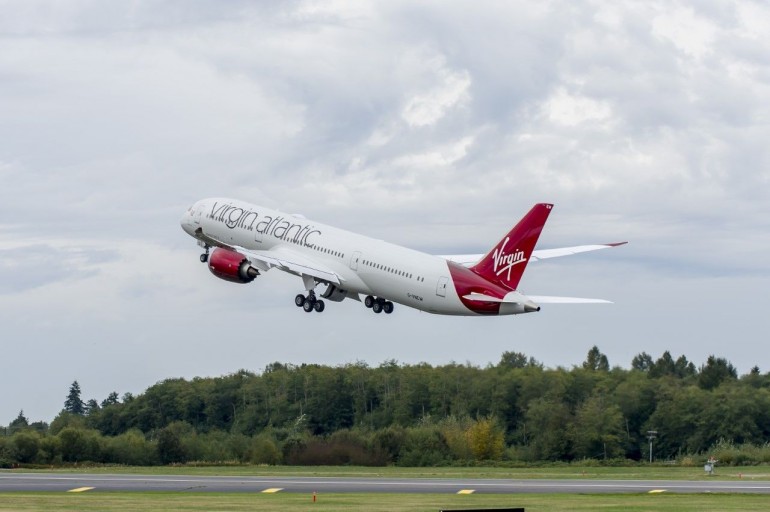Sponsored Listings:
Low carbon fuel project achieves breakthrough as LanzaTech produces jet fuel from waste gases for Virgin Atlantic
- For the first time ever, 1,500 US gallons of jet fuel has been produced from ‘Lanzanol’ – LanzaTech’s low carbon ethanol
- Producing the world’s first jet fuel derived from waste industrial gases from steel mills, via fermentation process
- The alcohol-to-jet (AtJ) fuel has passed all its initial performance tests with flying colours
- Initial analyses suggest the new fuel will result in carbon savings of 65% compared to conventional jet fuel
An innovative low carbon fuel project has taken a significant step forward after successfully producing 1,500 US gallons of jet fuel.
The breakthrough towards developing commercially viable low carbon fuel is the result of a partnership between Virgin Atlantic and LanzaTech.
Since 2011 they have been committed to producing the world’s first jet fuel derived from waste industrial gases from steel mills via a fermentation process.
The Lanzanol was produced in China at the RSB (Roundtable of Sustainable Biomaterials) certified Shougang demonstration facility.
The innovative alcohol-to-jet (AtJ) process was developed in collaboration with Pacific Northwest National Lab (PNNL) with support from the US Department of Energy (DOE) and with the help of funding from HSBC.
LanzaTech and Virgin Atlantic are now set to continue to work with Boeing and a host of industry colleagues to complete the additional testing aircraft and engine manufacturers require before approving the fuel for first use in a commercial aircraft.
Assuming all initial approvals are achieved, the innovative LanzaTech jet fuel could be used in a first of its kind proving flight in 2017.
Following a successful ‘proving flight’ the data collected will enable the partnership to seek approval to use the fuel on routine commercial flights.
This would also help pave the way for LanzaTech to fund and build their first commercial jet fuel plant to supply fuel to Virgin Atlantic and other airlines.
As a UK based partnership it is hoped the first LanzaTech jet fuel plant would be based in the UK. Sir Richard Branson said: “This is a real game changer for aviation and could significantly reduce the industry’s reliance on oil within our lifetime.
Virgin Atlantic was the first commercial airline to test a bio-fuel flight and continues to be a leader in sustainable aviation.
We chose to partner with LanzaTech because of its impressive sustainability profile and the commercial potential of the jet fuel.
Our understanding of low carbon fuels has developed rapidly over the last decade, and we are closer than ever before to bringing a sustainable product to the market for commercial use by Virgin Atlantic and other global airlines.”
Dr Jennifer Holmgren, Chief Executive of LanzaTech, said: “We can now truly imagine a world where a steel mill can not only produce the steel for the components of the plane but also recycle its gases to produce the fuel that powers the aircraft.
This program illustrates that such breakthroughs are only possible through collaboration. In this case, it is governments (US DOE, FAA, DARPA), laboratories (PNNL, AFRL, SWRI, MTU, UDRI), NGOs (RSB) and industry (Virgin, HSBC, Boeing, Shougang, Airlines for America) coming together to disrupt our current global carbon trajectory. We look forward to working with colleagues past, present and future to make this pioneering new fuel a commercial reality. “
The LanzaTech production process explained:
- Steel production produces waste carbon monoxide (CO) gas, which is frequently flared (burnt off) to the atmosphere as greenhouse gas CO2 (or sometimes used less efficiently for other purposes).
- The LanzaTech process involves capturing carbon from the waste gas via fermentation to ethanol, which is recovered to produce ethanol feedstock for a variety of products, including aviation fuel.
- Each gallon of ethanol is converted to produce 1/2 gallon of aviation fuel.
- The process could be used to capture and recycle around 1/3 of the carbon that steel facilities would otherwise release into the atmosphere.
Future potential of this technology
- Ground energy can be sourced carbon free – think solar or wind – but to make liquid fuels as per those needed for aviation you need a carbon source. Where this carbon comes from is up to us – new fossil resources, or recycled carbon.
- Recycling waste carbon streams is an effective way to keep fossil resources in the ground. Worldwide, around 1.7 billion metric tonnes of steel is produced every year and waste gases are produced through the chemistry of steel making.
- LanzaTech estimates that its process could be retrofitted to 65% of the world’s steel mills.
- This offers the potential to produce 30 billion gallons of ethanol worldwide, for around 15 billion gallons of jet fuel p.a.
- This would represent just under 19% of all aviation fuel currently used worldwide p.a. (80 billion gallon total world aviation fuel use).
Virgin Atlantic was founded by entrepreneur Sir Richard Branson over 30 years ago after he decided the UK aviation industry needed shaking up and style injected back into it.
On 22nd June 1984, Virgin Atlantic’s inaugural flight to Newark took place, on an aircraft filled with personal friends, celebrities and the media.
Today, Virgin Atlantic flies to over 30 destinations worldwide, including locations across the United States, the Caribbean, Africa, the Middle East and Asia.
Virgin Atlantic has been active in the sustainable aviation space for many years.
Its Change is in the Air sustainability programme was established in 2007.
Sustainable jet fuels are a key part of that programme’s carbon reduction focus.
Virgin Atlantic formally partnered with LanzaTech on its low carbon jet fuel in 2011.
The two companies have been working hard behind the scenes to progress the programme since then. HSBC joined the partnership in 2014.
Source: etbtravelnews.com










